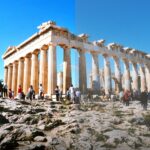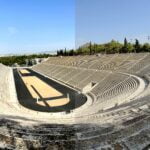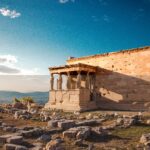Step back in time and brace yourself for a journey into the captivating world of ancient Greece. In this article, we will delve deep into the gone but not forgotten rivalry between two legendary cities: Athens and Sparta. But hold on tight, because we won’t be exploring the well-trodden paths of their monumental histories. No, dear reader, we are here to uncover the intriguing and lesser-known fun facts about these ancient powerhouses. So, join me as we unearth the fascinating secrets and shed light on the hidden treasures of Athens and Sparta. Prepare to be amazed as history comes alive before your eyes!
Fun Facts About Athens and Sparta
Athens and Sparta, the iconic cities of ancient Greece, have captured the imagination of historians and enthusiasts alike. Their historical rivalry, cultural differences, and unique contributions make them intriguing subjects to explore. Let’s delve into some fun facts about these legendary city-states that will transport you back in time!
Athens: A Beacon of Art and Democracy
Athens, the capital of Greece, holds a special place in history as the birthplace of democracy and a hub of artistic and intellectual achievements. Named after the Greek goddess Athena, Athens became synonymous with freedom, art, and democracy in the civilized world.
-
Did you know? The Acropolis in Athens, a UNESCO World Heritage site, is a remarkable historic landmark that showcases the city’s architectural prowess. It houses the iconic Parthenon, which was constructed as a temple dedicated to Athena.
-
Athens hosted the first modern Olympics in 1896, reviving the ancient tradition of athletic competitions that originated in ancient Greece. These games became a symbol of peace, unity, and friendly competition.
-
Athens became an economic powerhouse in ancient Greece, serving as a center for trade, commerce, and financial activities. The prosperity and wealth of the city attracted merchants, travelers, and scholars from all over the Mediterranean.
In the words of Socrates, a renowned philosopher from Athens, “An unexamined life is not worth living.” Athens embodies the spirit of inquiry, with its citizens actively engaging in intellectual discourse, challenging societal norms, and seeking knowledge.
Sparta: The Epitome of Spartan Discipline
In stark contrast to Athens, Sparta was known for its disciplined and military-trained society. The word “Spartan” itself has become synonymous with bravery, discipline, and austerity. Let’s uncover some intriguing facts about this warrior city-state.
-
Did you know? While Spartan men were committed to military service, Spartan women enjoyed more rights and freedoms compared to their counterparts in other Greek city-states. They had access to education and physical training, which nurtured their resilience and independence.
-
Sparta had a unique social system and constitution, emphasizing loyalty to the state and collective well-being. The city-state placed great importance on physical fitness and endurance, ensuring that its citizens were always prepared for battle.
-
One of the most remarkable figures in Spartan history is Cynisca, who became the first woman to win at the Olympic Games. Her victory challenged traditional gender roles and highlighted the strength and prowess of Spartan women.
Victor Davis Hanson, a modern-day historian, aptly described Sparta, saying, “Sparta was a state supported by a highly original system of slavery.” The state’s rigid social structure and dedication to martial pursuits played a crucial role in its rise to power.
The Unity of Athens and Sparta: A Historic Alliance
Although Athens and Sparta were fierce rivals in many aspects, they united during a critical moment in history to prevent the Persian invasion led by King Xerxes. This alliance, known as the Delian League, showcased their shared commitment to protecting Greece from external threats.
-
Together, Athens and Sparta demonstrated their strength and valor in the face of adversity, setting aside their differences for a greater cause. This alliance laid the foundation for the victory of Greek city-states against the Persian Empire in the battles of Marathon, Thermopylae, and Salamis.
-
Despite their contrasting approaches to governance and societal norms, Athens and Sparta both hold immense historic value for Greece and the world. Their contributions, whether in the realms of art, democracy, military prowess, or gender equality, continue to inspire and captivate generations.
In conclusion, Athens and Sparta remain fascinating entities of ancient Greece, each with its own distinct characteristics and historical significance. From Athens’ promotion of democracy and art to Sparta’s embodiment of discipline and military might, these two city-states have left an indelible mark on the pages of history. As we uncover more fun facts about Athens and Sparta, we come closer to understanding the rich tapestry of ancient Greece and the enduring legacy of these iconic cities.
The ancient city of Athens holds countless fascinating secrets waiting to be discovered. If you’re curious about the captivating history and intriguing facts about Athens, then you’re in for a treat. Explore our curated collection of mind-blowing tidbits about this iconic city and prepare to be amazed. From its legendary historical landmarks to its vibrant cultural heritage, Athens has a rich tapestry of stories that will transport you back in time. So, why wait? Click here to uncover incredible fact about Athens and embark on an unforgettable journey of discovery. Don’t miss out on this opportunity to delve into the hidden treasures of one of the world’s most renowned cities.
A Day in the Life of an Ancient Athenian: Insights into Ancient Greek Society
[youtube v=”ar8S6virCwM”]
Athens: Birthplace of Democracy, Center of Art and Intellectual Achievements
In 427 BCE, Athens, known as the birthplace of democracy, was embroiled in the fourth year of the Peloponnesian War against Sparta and its allies. In response to the superiority of the Spartan army, Athens had withdrawn to the safety of their fortified city walls, relying on their superior fleet and maritime empire for provisions. Despite the challenges posed by cramped conditions and a recent plague that decimated a third of the population, Athenian city life continued. Archaeas, a painter of high-class pottery, and his wife, Dexalea, lived in the heart of Athens and navigated the daily routines of their lives in this tumultuous time.
“The Athenians can’t match the formidable Spartan army on land so they’ve abandoned the countryside and moved inside the walls surrounding their city and port.”
Daily Life: Wealth, Slavery, and Gender Dynamics
Archaeas and Dexalea were relatively well-off compared to many Athenians. They owned slaves, who originally hailed from Thrace and were captured in war. One of their slaves, Thrata, took care of household chores and helped in raising their children. Phylon, a pedagogos, provided education to their son, teaching him reading and writing. While Archaeas attended a meeting of the ecclesia, the assembly of citizens, Dexalea remained at home, teaching her daughters the skills needed for domestic life.
“Our kiosk is relatively well off and takes great interest in the city’s affairs. Dexalea on the other hand can’t participate in politics or own property.”
The Athenian Assembly: Debates, Decision-Making, and Contradictory Resolutions
The meeting of the ecclesia takes place on the hill west of the Acropolis, known as the Pnyx. During this particular gathering, the central topic was the fate of the people of Mytilene, a city on the island of Lesbos that had revolted against Athenian rule. Various citizens expressed their opinions, with some advocating for mercy and others calling for vengeance. Ultimately, a motion was proposed to execute all the Mytilenians and enslave their women and children. This resolution passed with a majority raising their right hands in favor.
“A motion is proposed to execute all the Mytilenians and enslave their women and children because they betrayed their Athenian allies during a time of war.”
Reflection and a Twist of Fate
After the meeting, Archaeas returns home and shares the outcome with Dexalea. She disagrees with the decision to kill both the innocent and the guilty, viewing it as harsh and counterproductive. Archaeas, influenced by his wife’s perspective, attends a symposium with his friends where they discuss the meeting and eventually change their stance, urging mercy.
“Around dusk, Archaeas goes to a friend’s house for a symposium…his friends eventually agree.”
The Unprecedented Second Debate
In an unprecedented turn of events, another meeting is announced by the council. This second debate intensifies, but a new resolution to execute only the leaders of the revolt narrowly passes. However, a ship was already dispatched to execute the original resolution. Urgently, another ship sets sail to countermand the order, representing a race against time to rectify the conflicting decisions.
“A new resolution to execute only the leaders of the revolt narrowly passes…a ship quickly set sail to countermand the order.”
Historical Significance and Enduring Inspiration
This glimpse into the daily life of an ancient Athenian sheds light on the complexities of society and decision-making during a time of war. Athens, renowned for its contributions to democracy, art, and intellectual achievements, played a pivotal role in shaping ancient Greek civilization. While Athens and its rival city-state, Sparta, differed in their social structures and values, both hold historic value and continue to inspire.
“Despite their differences, both Athens and Sparta have historic value and continue to inspire.”
Through ancient texts and archaeological discoveries, we gain a deeper understanding of the ancient world and the individuals who shaped its history. The rich tapestry of daily life in ancient Athens presents us with a multifaceted society filled with conflicting viewpoints, moral dilemmas, and the persistent pursuit of justice.
“This glimpse into the daily life of an ancient Athenian sheds light on the complexities of society and decision-making during a time of war.”
FAQ
Question 1
What are some notable achievements of Athens and Sparta in Ancient Greece?
Answer 1
Athens is renowned for being the birthplace of democracy and is often considered the cradle of Western civilization. It produced remarkable philosophers like Socrates, Plato, and Aristotle, who revolutionized the field of philosophy. On the other hand, Sparta was known for its military might and discipline. The Spartans earned fame for their victory over Athens in the Peloponnesian War and their role in defending Greece against the Persian invasion led by King Xerxes.
Question 2
What were the major differences in the social structures of Athens and Sparta?
Answer 2
In Athens, the society was based on democracy. It was a center of intellectual and artistic pursuits, offering its citizens the freedom to participate in politics and enjoy cultural events. Sparta, however, had a strictly regimented and militaristic society. Spartan citizens were trained as soldiers from a young age and were expected to prioritize military service above all else. Women in Sparta also had more rights compared to other city-states in Ancient Greece.
Question 3
What are some significant cultural contributions of Athens and Sparta?
Answer 3
Athens was a hub of artistic and intellectual achievements. It is widely revered for its architecture, particularly the iconic Acropolis and the stunning Parthenon. Athens also hosted the first modern Olympic Games in 1896, reviving the ancient tradition. Sparta, on the other hand, focused on the physical and martial aspects of culture. Spartans valued discipline, physical strength, and endurance, creating a unique warrior society that emphasized military glory.
Question 4
Who were some notable figures from Athens and Sparta?
Answer 4
Athens boasted numerous renowned thinkers and philosophers, including Socrates, Plato, and Aristotle. These great minds shaped the foundations of Western philosophy and made lasting contributions to humanity. Sparta, meanwhile, is known for historical figures such as King Leonidas, who led the famous 300 Spartans in the Battle of Thermopylae, and Cynisca, the first woman to win at the Olympic Games.
Question 5
How did the rivalry between Athens and Sparta shape Ancient Greece?
Answer 5
The bitter rivalry between Athens and Sparta had a significant impact on the course of Ancient Greek history. The two city-states had contrasting political systems, cultural backgrounds, and methods of acquiring power. Their conflict culminated in the Peloponnesian War, where Sparta emerged as the victor and briefly held dominance over Greece. This rivalry ultimately weakened both city-states and paved the way for the conquest of Greece by outside forces.
- Unveiling the Enigma: Mansoureh Khojasteh Bagherzadeh’s Public Appearances & Private Life in Iran - July 18, 2025
- Unveiling the Mystery: Mansoureh Khojasteh Bagherzadeh’s Husband: A Rare Glimpse into a Private Life - July 18, 2025
- Unveiling Masoud Khamenei’s Mother: Power, Influence, and Iran’s Future - July 18, 2025
















